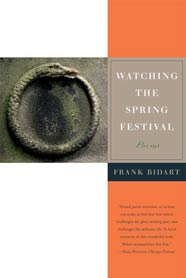 In keeping with this blog’s name, I’ll be writing a weekly post about a poem, poet, poetic technique or book with some connection to dance — or that can be read from a dancer’s perspective.
In keeping with this blog’s name, I’ll be writing a weekly post about a poem, poet, poetic technique or book with some connection to dance — or that can be read from a dancer’s perspective.
I was going through an old journal, searching for fragments to mine for an ongoing project, when I found notes on Frank Bidart’s Watching the Spring Festival (2008). Based on my scribbles, it seems I wasn’t especially moved by this book of lyric poetry, with its flat-sounding meditations on mortality. I much preferred the tonal variety and page-as-stage explorations of Bidart’s dramatic monologues and longer poems in other books. One of these days I’ll reread and write about his 30-page “The War of Vaslav Nijinsky” — maybe in November, when the National Ballet remounts John Neumeier’s Nijinsky.
There was one poem in Watching the Spring Festival that stood out to me: “Ulanova at Forty-Six At Last Dances Before a Camera Giselle.” In it, a persona watches a grainy clip of the famous Bolshoi ballerina Galina Ulanova, who finally allowed herself to be filmed dancing Giselle while on tour in London in 1956. She was 46 years old.
The poem examines the nature of tragedy in Giselle, its gender and class politics, the power Giselle has over Albrecht — as the young woman who will always be beautifully frozen in time, the woman who takes her own life but ends up saving his out of love, even beyond the grave. While watching Ulanova, the poem’s persona also awakens to an understanding of art’s relationship with time — especially the performing artist’s challenge of reproducing a role through the years even as her own body changes and ages. Ulanova is a dancer who has danced Giselle so many times that each gesture, while new,
“carries with it all the others, so what you dance
is the circle or bubble you carry that is all this.”
I love that idea — of a dancer’s gesture containing all the other times she’s performed the same movement. (Like a dancing Matryoshka nesting doll?) Isn’t this one of the hallmarks of a dancer’s artistic maturity — when you can read a whole history, a world of meaning in a single step? I’ve always wondered what it’s like for older performers, who may remember a time when their bodies could leap longer, extend higher, turn faster. Bidart’s poem says:
“Her body
hopping forward
remembers the pathos of the difference. Each
hop is small, but before each landing she has
stepped through
many ghosts.”
That line about stepping through many ghosts — lovely. How many ghosts — of our dreams, our failures — haunt us and follow us around in our daily lives? How many previous and projected selves do we carry in our arms? How much does the body remember, how much of our histories are written on our bodies?
Critics were unanimous in their praise of Ulanova’s filmed performance, raving about her soulful interpretation, the charming girlishness of her Giselle in Act One, her embodiment of harmony in Act Two. I had to see if Ulanova’s technique measures up to today’s standards. Here’s Ulanova in Act Two (you’ll have to go see it on YouTube, as the owner has disabled playback on other websites).
While there’s something about her neck and upper body that seems to me a bit strained, perhaps revealing her as an older dancer — there’s also a vulnerability, a lightness to her jumps that hover but don’t really soar. I love the supported sissones at 1:08 and the backward-moving entrechat quatres. My favourite section has to be from 3:27 to 4:11 when, in a flurry of jumps, she defies her role as an earthbound spirit to reveal the lighthearted, joyful girl she once was. Maybe the reason Ulanova’s Giselle still captivates is that she truly embodies the character’s contradictions — both innocence and maturity, joy and despair, the fleetingness of youth and the lasting power of memory.
I can almost imagine Ulanova on stage thinking, this is how history will remember me, as a beautifully tragic and aging Giselle. My body remembers so much more, though — but that’s beyond the power of any camera or poet to ever capture.


Love the old pictures! 🙂
I do too. Isn’t Ulanova charming in them? 🙂 I recently watched a clip of Natalia Osipova’s Giselle — holy wow, SHE is gorgeous. Those leaps! I think she’s my new favourite.
Haha yes Osipova is grand!!